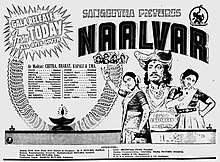Naalvar
| Naalvar | |
|---|---|
 Poster | |
| Directed by | V. Krishnan |
| Produced by | M. A. Venu |
| Written by | A. P. Nagarajan |
| Starring |
|
| Music by | K. V. Mahadevan |
Production company |
Sangeetha Pictures |
| Distributed by | Sangeetha Pictures |
Release date | 5 November 1953 |
| Country | India |
| Language | Tamil |
Naalvar (English: Four people) is a 1953 Tamil-language drama film directed by V. Krishnan. The film stars A. P. Nagarajan, Kumari Thangam, N. N. Kannappa M N KRISHNAN and Muthulakshmi in major roles. Nagarajan who played the main lead was also the writer of the film.[1] The film revolves around a family consisting of four siblings.
Plot
A. P. Nagarajan, a sincere cop is the eldest of four siblings in a family whose father works as a secretary to a mill owner. The second of the four siblings is a lawyer, third is employed in the same mill where their father works as a supervisor, [ MN Krishnan]and the youngest of all is a social activist. Nagarajan happens to meet Kumari Thangam, not knowing the fact that she is the daughter of his father's boss charges her for an offence. He is very sincere in his duty to such an extent that he even arrests his own brother when the latter commits a crime, and even takes the blame when his father's enemies try to make that his father was involved in smuggling of gold and printing of forfeited currency notes, in order to protect his father and the image of the family.
Cast
- A. P. Nagarajan
- Kumari Thangam
- N. N. Kannappa
- M. N. Krishnan
- S. R. Janaki
- R. Balasubramaniam
- C. R. Vijayakumari
- T. P. Muthulakshmi
- V. M. Ezhumalai
- E. R. Sahadevan
- S. S. Majid
- Ratnakumari
- N. S. Narayana Pillai
- V. N. Natesan
- A. R. Damodaram
- T. K. Swaminathan
- V. R. Natarajan
- T. V. Satyamurthi
- Gauthamdas
- K. N. Kanakasabai
Production
Naalvar was shot at the Central Studios, Coimbatore and was produced by M. A. Venu under the banner Sangeetha Pictures. V. Krishnan was the director and the script was provided by A. P. Nagarajan.[2] Nagarajan later became a successful film-maker as he went on to direct many successful films such as Thillana Mohanambal, Thiruvilayadal, Kandan Karunai and Thirumal Perumai in Tamil cinema within a span of two decades. These films earned a cult status in Tamil Nadu.[1] C. R. Vijayakumari, who later became a popular actress in her own right in Tamil films, played a small role in the film.[1]
Soundtrack
The background and soundtrack was provided by K. V. Mahadevan. Lyrics were penned by A. Maruthakasi, Thanjai N. Ramaiah Dass and Ka. Mu. Sheriff. Nagarajan also lent his voice for a song in the film along with the composer. Playback singers are N. L. Ganasaraswathi, U. R. Chandra, A. G. Rathnamala, Ponnammal, M. L. Vasanthakumari, K. Rani and Thiruchi Loganathan.[3]
| No. | Song | Singer/s | Lyricist | Duration (m:ss) |
|---|---|---|---|---|
| 1 | Arul Thaarum Emathannaiye | N. L. Ganasaraswathi | A. Maruthakasi | |
| 2 | Agapattu Kondaayaa | U. R. Chandra & A. G. Rathnamala | ||
| 3 | Irul Soozhum Vaanil | M. L. Vasanthakumari | ||
| 4 | Inbam Kolludhe | |||
| 5 | Vaana Veedhiyil Parandhiduvom | Thiruchi Loganathan & M. L. Vasanthakumari | ||
| 6 | Abaraadham Ruubaa Aimbadhu | K. V. Mahadevan & K. Rani | Thanjai N. Ramaiah Dass | |
| 7 | Kannu Therinju Nadakkanum | A. P. Nagarajan & U. R. Chandra | ||
| 8 | Valluvanaar Seydha Thozhil | U. R. Chandra, Ponnammal & group | Ka. Mu. Sheriff |
Release and reception
Naalvar was released on 5 November 1953.[4] The film fared well at the box-office and Nagarajan came to be known as "Naalvar Nagarajan".[1]
References
- 1 2 3 4 Guy, Randor (17 March 2012). "Blast from the past — Naalvar 1953". The Hindu. Retrieved 4 May 2012.
- ↑ V. Raman, Mohan. "Master of mythological cinema". The Hindu. Retrieved 13 May 2012.
- ↑ G. Neelamegam. Thiraikalanjiyam — Part 1 (in Tamil). Manivasagar Publishers, Chennai 108 (Ph:044 25361039). First edition December 2014. p. 54.
- ↑ Film News Anandan (2004). Sadhanaigal Padaitha Thamizh Thiraipada Varalaru [Tamil film history and its achievements] (in Tamil). Chennai: Sivagami Publishers. Archived from the original on 2017.
Further reading
- Sundararaj, Theodore Baskaran (1996). The eye of the serpent: an introduction to Tamil cinema. Madras: East West Books.
- M. S. S., Pandian (1992). The image trap: M.G. Ramachandran in film and politics. Sage. ISBN 9780803994034.
- Rajadhyaksha, Ashish; Willemen, Paul (1999). Encyclopaedia of Indian cinema. British Film Institute.